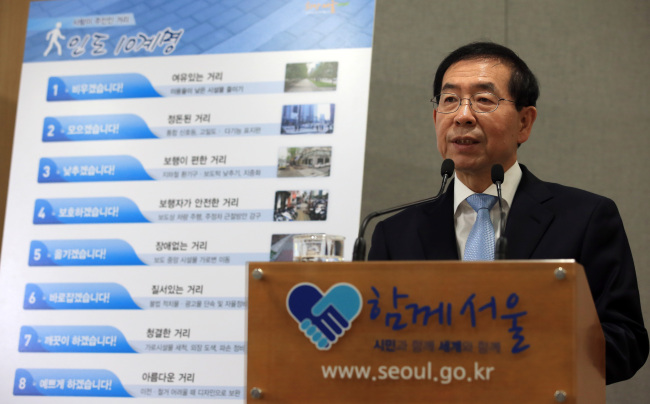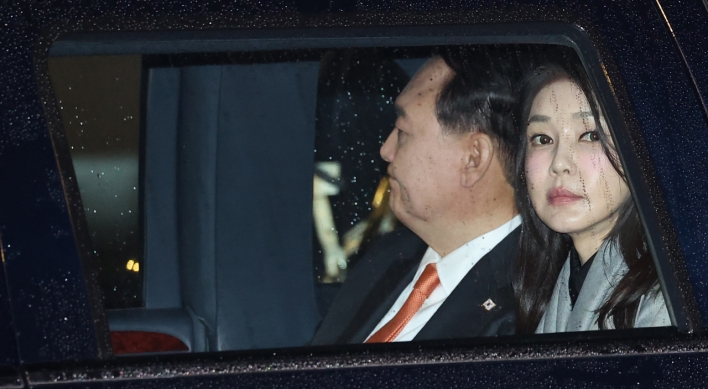With a soaring number of migrants in society, Korea should push for affirmative action measures to help curb discrimination, promote coexistence with those from various backgrounds and bring about inclusive growth, Seoul Mayor Park Won-soon said.
The city government has been working with the International Organization for Migration for the first International Migrants Day campaign in Seoul to kick off Thursday, aimed at promoting awareness about migrants by highlighting their contributions to Korea.
Given rampant bias that often turns into hate speech, affirmative action plans similar to those in the U.S. will play a significant role in boosting public understanding about migrants and building a social safety net for the minorities, Park said.
“It will take a long time to practically achieve equal rights in society as far as (discrimination) remains embedded in the people’s subconscious, which is why I think we need affirmative action,” he said in a recent interview with The Korea Herald.
Seoul City, for its part, has its own measures to harness affirmative action such as in hiring civil servants or public workers, he said. Currently, people with disabilities account for 10 percent of the entire workforce of the city government.
The city government has been working with the International Organization for Migration for the first International Migrants Day campaign in Seoul to kick off Thursday, aimed at promoting awareness about migrants by highlighting their contributions to Korea.
Given rampant bias that often turns into hate speech, affirmative action plans similar to those in the U.S. will play a significant role in boosting public understanding about migrants and building a social safety net for the minorities, Park said.
“It will take a long time to practically achieve equal rights in society as far as (discrimination) remains embedded in the people’s subconscious, which is why I think we need affirmative action,” he said in a recent interview with The Korea Herald.
Seoul City, for its part, has its own measures to harness affirmative action such as in hiring civil servants or public workers, he said. Currently, people with disabilities account for 10 percent of the entire workforce of the city government.

“The Seoul-style affirmative action was put in place for vulnerable members of society, including North Korean defectors and those from multicultural families. They deserve decent entitlements,” the former civil rights activist added.
Despite lingering controversy over affirmative action in the U.S. and elsewhere, many civic groups and academics have voiced the need for a Korean edition to better accommodate and collaborate with people from other racial, ethnic, cultural and religious backgrounds.
The idea of affirmative action was initially floated years ago as a way to heal deep social strife chiefly originated from partisan regionalism, according to Lee Il-hyung, a professor at the University of Missouri’s School of Law. Supporters called for programs in education and civil service for preferential treatment of those from traditionally disfavored regions.
Powered by demographic changes, however, the discourse has recently spilled over into migrant workers, marriage immigrants and refugees.
Yet any nationwide legislation appears far-fetched. Critics reject the notion of quotas and urge the virtues of open competition and individual hard work, instead of what they call “reverse discrimination.”
“The rhetoric heard in Korea relating to region-based affirmative action has a similar ring to the debate over raced-based affirmative action programs in the U.S. References to legal equality are heard from both sides of the Pacific and on both sides of the argument,” Lee wrote in the 2013 book, “Law and Society in Korea.”
Early this year, debate heated up online over a bill calling for ensuring rights to education and medical care for the children of migrants in the country.
The bipartisan legislation appeared in line not only with the U.N. Convention on the Rights of the Child but also President Park Geun-hye’s campaign pledges. But social networking sites were flooded with a furor against what was deemed “favors for the offspring of illegal immigrants” and hateful attacks on Jasmine Lee, a Philippine-born Korean lawmaker who cosponsored the bill.
The IOM’s International Migrants Day campaign is designed to help prevent such a consumptive squabbling and shift the paradigm in this homogenous society, according to Park Mi-hyung, head of the Seoul office, which opened in 1999.
Its two main themes, “Migrants Contribute” and “Migration Means,” derived from two global campaigns initiated by the Geneva-headquartered agency in 2013 and 2014, respectively. They reflect the IOM’s efforts to raise awareness of how migrants contribute to societies in economic, cultural, technical and other various aspects, according to Park Mi-hyung, head of the Seoul office.
“With the number of international migrants in Korea reaching 1.7 million and inevitably rising in the coming years, protecting their rights, recognizing their potential and integrating them into Korean society is increasingly important,” she said.
“These migrants give us an exceptional opportunity to build a more diverse and resilient Korea, and the campaign is a key step toward promoting a mutual understanding between migrants and citizens while raising awareness of migrant issues.”
During the weeklong event, it will display giant posters featuring different types of migrants in the country in Seoul Plaza, as well as some 200 photos carrying the answers of people in Korea and around the world to the question, “What does migration mean to you?”
To the mayor, migration means hoping together.
“Many people move to Seoul hoping for a better life and more opportunities. It is one of Seoul City’s priorities to hope together with its 400,000 migrants, so that their hopes can come true,” Park added.
By Shin Hyon-hee (heeshin@heraldcorp.com)
Claire Lee contributed to this article. ―Ed.



![[AtoZ Korean Mind] Does your job define who you are? Should it?](http://res.heraldm.com/phpwas/restmb_idxmake.php?idx=644&simg=/content/image/2024/05/06/20240506050099_0.jpg&u=)














![[K-pop's dilemma] Is Hybe-Ador conflict a case of growing pains?](http://res.heraldm.com/phpwas/restmb_idxmake.php?idx=642&simg=/content/image/2024/05/07/20240507050746_0.jpg&u=)